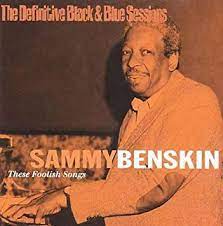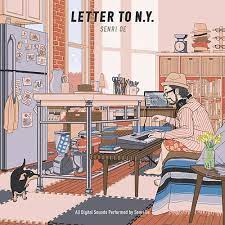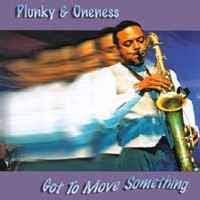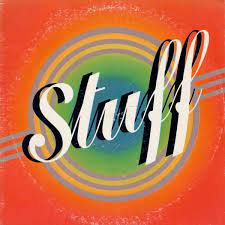
Daily Dose Of Jazz…
Samuel Benskin was born in The Bronx, New York on September 27, 1922 and made his professional debut around 1940 as piano accompanist to singer and guitarist Bardu Ali. He worked throughout the 1940s with among other jazz musicians Stuff Smith, Benny Morton and Don Redman. The 1950s witnessed Sammy leading his own piano trio, appearing as a soloist and accompanying singers Roy Hamilton, Dinah Washington and Al Hibbler. In 1954 he also joined a group, The Three Flames, which also featured Tiger Haynes.
By the end of the decade with a band credited as The Spacemen, Sammy recorded an instrumental, The Clouds, written and produced by Julius Dixson for his Alton record label. A departure from jazz, the song’s original vocals were removed and presented as an instrumental. It went to No. 1 on the Billboard R&B chart, and No. 41 on the pop chart. The song was the first number one on any chart released by an African-American owned independent record label, predating Motown’s first No. 1 by a year.
From the 1960s Benskin worked primarily as a vocal coach, arranger and producer. In 1986, he recorded an album in Paris, France for Black & Blue Records, These Foolish Songs. Pianist Sammy Benskin transitioned in Teaneck, New Jersey on August 26, 1992 at 69.
More Posts: arranger,bandleader,history,instrumental,jazz,music,piano,producer

Daily Dose Of Jazz…
Senri Oe was born on September 6, 1960, in Fujiidera city, Osaka, Japan. He began playing piano at the age of three, and was trained by his junior high school teacher Yumi Nara, who would go on to become an acclaimed opera singer. After each of the lessons, Nara would encourage him to improvise, and eventually he began to compose.
Upon being introduced to music by The Carpenters, Captain & Tenille and Gilbert O’Sullivan, Oe decided to become a singer-songwriter. Soon after, Oe’s music repertoire expanded to include jazz musicians such as Chris Conor, Bill Evans, Thelonious Monk, Antonio Carlos Jobim, Winton Kelly, Miles Davis and Charlie Parker.
In 1975 at 15 Oe intended to study jazz but after participating in the final Yamaha Popular Song Contest POPCON, in 1980 he entered Kwansei Gakuin University majoring in economics while simultaneously beginning to pursue a professional music career. He formed his first band during his time at university, was scouted by Sony Music and signed to Epic Sony Japan in 1981. His pop career unexpectedly took off and he chose to put his jazz aspirations on hold.
At the New School for Jazz, in 2008 Senri moved to Manhattan, New Yorkand later He went on to start a prolific carrer as a pop singer/songwriter but in 2007 he began his serious study of jazz. After graduating from The New School for Jazz, he launched his jazz record label, Peace Never Die Records, in 2012. His jazz debut album was Boys Mature Slow the same year. As of 2021 he has released another six albums under the PND label.
Oe’s work towards composing for a drum-less trio was titled Collective Scribble, with saxophone, piano and upright bass. He has recorded as a leader with Sheila Jordan, Jon Hendricks, Theo Bleckmann and Lauren Kinhan. His Answer July was nominated for a Grammy in the Best Jazz Album category in 2017.
Pianist, composer, producer, actor, singer, and songwriter Senri Oe continues to compose, perform and stretch the realms of his jazz imagination, while writing and producing music for other artists and film soundtracks.
More Posts: bandleader,history,instrumental,jazz,music,piano,producer,vocal

Daily Dose Of Jazz…
James “Plunky” Branch was born on July 20, 1947 in Richmond, Virginia and educated in the city’s segregated schools. He then attended Columbia University in New York City, but by 1971 he had moved to San Francisco, California. It was here that he formed Juju, a musical group that combined rhythm and blues, jazz, soul, and African musical influences.
He founded the band Plunky & Oneness, which began as Juju in 1971 which he renamed twice, Oneness of Juju and Plunky & the Oneness of Juju, before it was given its current name in 1988. One of Plunky & Oneness’ songs, Every Way But Loose, is featured on the video game Grand Theft Auto: Vice City Stories, playing on fictional radio station Paradise FM.
Branch is the president and founder of the independent record label N.A.M.E. Brand Records, through which he has released 25 albums. As a studio musician Plunky has worked for The Cosby Show and has appeared on several avant-garde jazz albums.
As an educator he has been Director of the Jazz Ensemble at Virginia Union University as well as an instructor of Afro-American Music History at Virginia Commonwealth University.
He has been the recipient of two NEA Jazz Fellowships and was appointed to the Governor’s Task Force for the Promotion of the Arts in Virginia. In 1999 he was recognized by Richmond Magazine as Musician of the Year for 1999. J. Plunky Branch continues to perform, record, compose and produce.
More Posts: bandleader,educator,history,instrumental,jazz,music,producer,saxophone,songwriter

Daily Dose Of Jazz…
Douglas Anthony Munro was born July 9, 1953 in Yonkers, New York. He started his musical studies at age seven, taking drum lessons and by age fourteen, he was playing dances in Yonkers and New York City. At 20, he broke his back in a gymnastics accident, which ended his career as a drummer. However, in 1977 the 24 year old underwent a successful back surgery, and began playing guitar to pass the time during recovery
After his recovery he became a guitarist, performed locally and taught guitar lessons. In 1986 he released the LP Courageous Cats. and towards the end of the decade Doug met record producer Joe Ferry, and began a 25 year professional relationship. He would go on to divide his career into arranging, performing, teaching, and producing with Ferry. In 2004 he started a series of four Boogaloo recordings for Scufflin’ Records. The first, Boogaloo to Beck, featured Lonnie Smith, David “Fathead” Newman, and Lafrae Olivia Sci. He would go on to release to Brazilian jazz albums under the Big Boss Bossa Nova title.
The early Nineties saw Doug arranging and producing with Joe Ferry. Their first album, We Remember Pastorius, was a tribute to jazz bassist Jaco Pastorius. He would go on to co-produce and arrange a series of recordings for Shanachie Records. This period saw him delving into ska, receiving two Grammy nominations. In 1997 Munro added orchestrations to the original motion picture soundtrack for the Muhammad Ali documentary When We Were Kings which won the Academy Award for Best Documentary Film.
Munro continued to work on over 40 recording albums into the new millennium with Vitamin Records. He has produced lessons for Just Jazz Guitar, Premier Guitar, and TrueFire.com. He founded the jazz studies program in the Conservatory of Music at Purchase College in 1993, and served as the director of the program from 1993-2002. He retired in 2019 as Professor Emeritus and Director Emeritus of the Jazz Studies program at the Conservatory of Music at Purchase College.
Guitarist, arranger, producer, composer, author, and educator Doug Munro specializes in jazz, bebop, Brazilian jazz, jazz fusion, and gypsy swing. Since 1986 he has released over fifteen albums as a band leader and has appeared on over 75 recordings as a guitarist, sideman, producer, and arranger. He has been nominated for two Grammy Awards and was the recipient of two NAIRD Awards by the American Association of Independent Music.
More Posts: arranger,bandleader,composer,educator,guitar,history,instrumental,jazz,music,producer

Daily Dose Of Jazz…
Herbie Lovelle was born June 1, 1924 in Brooklyn, New York. His uncle was drummer Arthur Herbert. He began his career in the late 1940s with the trumpeter, singer and bandleader Hot Lips Page. By the 1950s he was playing with the saxophonist Hal Singer, Johnny Moore’s Three Blazers and the pianist Earl Hines.
Through working for both Lucky Thompson and Jimmy Rushing of Count Basie’s Orchestra, he became house drummer at the Savoy Ballroom in New York City for much of the 1950s. He toured with the tenor saxophonist Arnett Cobb and the pianist Teddy Wilson in 1954.
He contributed to the pianist Paul Curry’s album Paul Curry Presents the Friends of Fats in 1959. Then in the early years of television, Herbie performed with the King Guion Orchestra on the Jerry Lester Show and the Ed Sullivan Show. In 1966, he was the lead drummer for the Sammy Davis, Jr. TV show.
During the 1950s Lovelle began playing more R&B and worked as a studio musician recording behind Sam Taylor, Bob Dylan, Pearls Before Swine, Eric Andersen, David Blue, John Denver, Tom Rush, B. B. King, John Martyn, the Strangeloves, the McCoys, and the Monkees. He continued working as a studio musician well into the 1980s.
In 1976, he produced the first album by Stuff, which went platinum in Japan. He also played drums in the 1976 revival of Guys and Dolls. From the 1980s on he acted in film and television, on such shows as Law & Order and Third Watch. His film credits ~ A Man Called Adam, Bella, Mitchellville, The Rhythm of the Saints, Don’t Explain, The Curse of the Jade Scorpion, and Down to Earth among others.
His list of recordings as a studio musician extended across genres to some six dozen albums with jazz notables Candido Camero, Buck Clayton , Art Farmer, Herbie Mann, Sonny Stitt, Budd Johnson, Buddy Tate, Chico O’Farrill, Evie Sands, Johnny Hodges, Nat Adderley, Tony Bennett, Illinois Jacquet and numerous others. Drummer, producer and actor Herbie Lovelle transitioned on April 8, 2009 in New York City.




